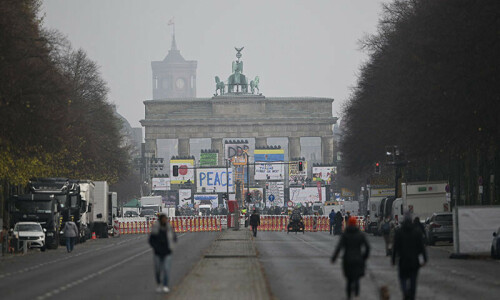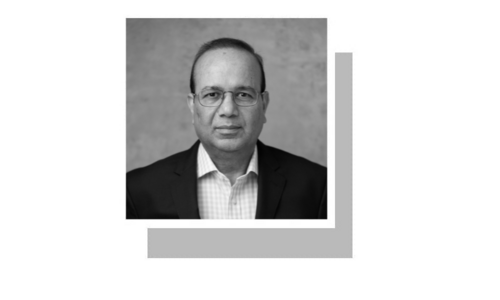
BERLIN: Germany is headed for snap elections on February 23, the main parties agreed on Tuesday, aiming to form a stable government after Chancellor Olaf Scholz’s three-party coalition collapsed last week.
The country’s two biggest parties agreed on the early timetable, which will see centre-left leader Scholz seek a vote of confidence on December 16, said the parliamentary leader of Scholz’s Social Democrats (SPD), Rolf Muetzenich.
This would pave the way for the February vote in a compromise hammered out with the conservative opposition Christian Democrats (CDU) and their Bavarian allies CSU.
The agreement seeks to quickly restore political stability at a time when Europe’s biggest economy is set to shrink for a second year in a row and amid heightened geopolitical volatility, with wars raging in Ukraine and the Middle East.
As per agreement between two biggest parties, Chancellor Scholz will seek trust vote on Dec 16
The election date would mean Germany will be ruled by a lame-duck chancellor and stuck in the middle of its campaign period when Donald Trump is inaugurated as US president on January 20.
Embattled Scholz, who wants to run again despite poor poll ratings, initially suggested an election in late March but came under heavy pressure from all other parties to speed up the process.
The CDU is riding high in the polls and its leader Friedrich Merz had pushed strongly for an election as early as possible — a demand backed by two thirds of voters, according to a recent survey.
“We don’t have unlimited time to elect a new government in Germany, regardless of who leads it… because the world around us is not waiting,” Merz said on Tuesday.
“It’s not as if everyone is holding their breath and watching Germany in fascination, as decisions are taken in Europe, Asia and the United States.
“The world expects a Germany that is capable of taking action.”
Winter election campaign
The February 23 date would force politicians to run their campaigns in the dark and cold of winter, when voters will be less enthusiastic to flock to outdoor events than during the usual summer campaign seasons.
Scholz is expected to lose the confidence vote in the lower house of parliament, after which President Frank-Walter Steinmeier will have 21 days to dissolve the Bundestag.
Elections have to be held within 60 days of the dissolution.
Scholz took office in late 2021, taking over from the CDU’s Angela Merkel, in a three-way coalition with the left-leaning Greens and the liberal and pro-business Free Democrats (FDP).
But mounting differences over economic and fiscal policy came to a head last week when Scholz fired the rebellious FDP finance minister Christian Linder, prompting the small party to leave the government.
Since then, Scholz’s SPD and the Greens have carried on in a minority government that would need opposition support to pass any laws — something the CDU/CSU had rejected in the absence of clarity on an election date.
Future scenarios
Scholz’s coalition marked the first time a tripartite alliance has ruled at the federal level, and it may not be the last, given Germany’s increasingly fragmented political party landscape.
Fears about immigration have driven the rise of the far-right Alternative for Germany (AfD) party. It is now polling at close to 20 per cent, but other parties have pledged to shun it as a coalition partner.
The latest polls put the centre-right CDU/CSU alliance firmly in the lead at 32pc.
To win a majority, however, the conservatives would likely need the future backing of the SPD, which is currently polling at 15.5pc, in a so-called grand coalition, plus a third party.
Contenders for that spot, according to current polling, would be either the FDP, with five percent support, or possibly the Greens, who are polling at 11pc.
Lindner, who has said he wants to be finance minister again, on Tuesday welcomed the date for new elections, saying:“Happily we now have clarity on this question.” He earlier said that he thought Merz “will almost certainly be the next chancellor of Germany. The only question is: Who will chancellor Merz govern with?”
Published in Dawn, November 13th, 2024












































Dear visitor, the comments section is undergoing an overhaul and will return soon.